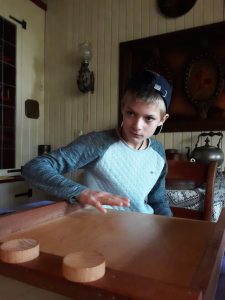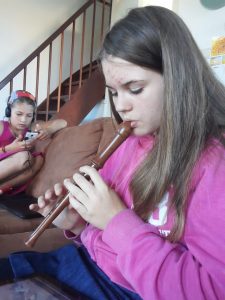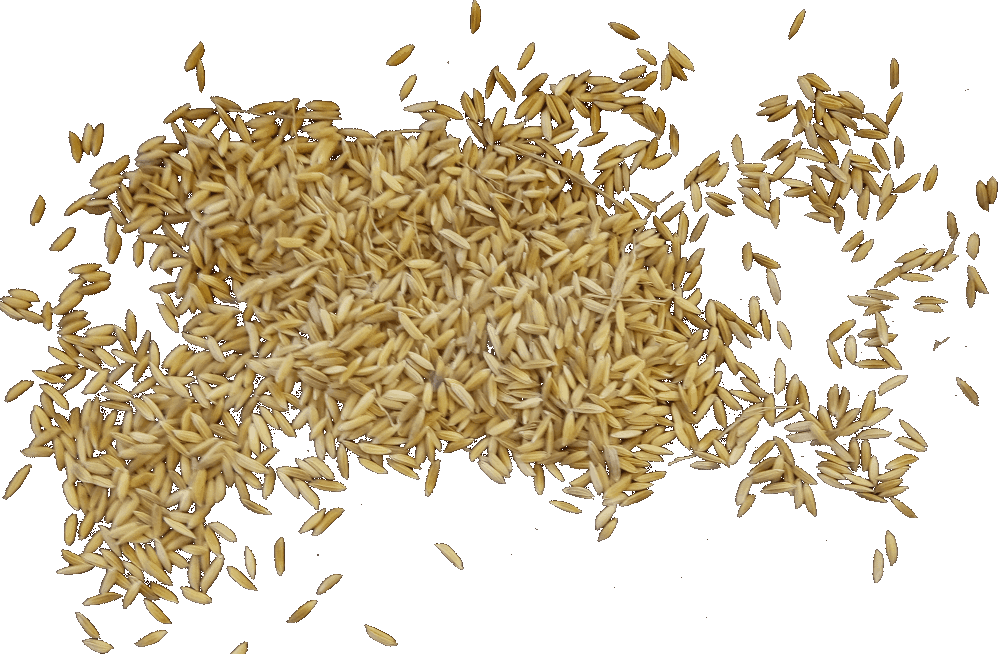The Corona virus is spreading and everybody needs to stay at home.
Working and learning at home can be a challenge. With the ungoing crisis we thought it is time for some home education tips.
You can read our tips on Facebook as well.
Tip #1 – Home is not a school (31-03-2020)
Tip #2 – Little ones first! (01-04-2020)
Tip #3 – A schedule is good, a rhythm better (02-04-2020)
Tip #4 – We do the chores together! (03-04-2020)
Tip #5 – You Don’t Have to be an Expert (06-04-2020)
Tip #6 – Make Use of the Concentration Peak (07-04-2020)
Tip #7 – Read With and To Your Child (07-04-2020)
Tip #8 – Grace and Mercy are the Winning Team (14-04-2020)
Tip #9 – Play! (15-04-2020)
Tip #10 – A Love for Learning (17-04-2020)
Tip #1 – Home is not a school (31-03-2020)
Many home educators prefer the term ‘home education’ over ‘homeschooling’. Education at home does not turn your home into a school. Relax: home education starts with home. So take time to think and talk about what makes a home: What defines us as a family? What traditions are in place? Should we start some new ones? HOME is the firm foundation for successful home education. And even you feel not much education is going on: at least you are giving your children a gift beyond measure: home.
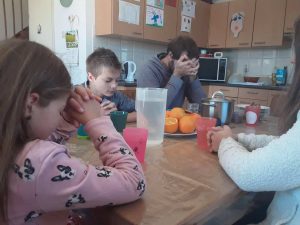
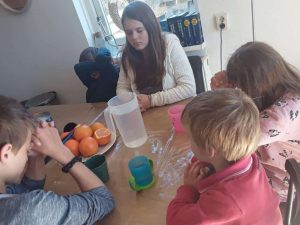
Tip #2 – Little Ones First (01-04-2020)
Helping older children with their work while little ones keep you perfectly distracted is very frustrating. That’s why it’s a good idea to spend time with your pre-schoolers first. We love reading together, but a game or some other activity with mom or dad is fine too. After about half an hour of filling their ‘love tanks’ with your kind attention, they are ready to play on their own; freeing you to help older ones. Personally I enjoy this way of starting the day very much: it’s easy, enjoyable and comes with great rewards.
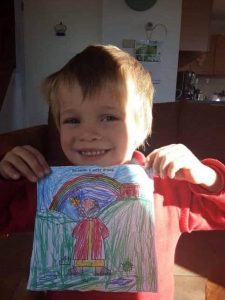
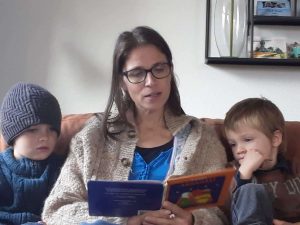
Tip #3 – A schedule is good, a rhythm better (02-04-2020)
A timed schedule for the day looks very professional indeed … until real life kicks in and interruptions great and small mock your beautiful plans. We use a rhythm instead. A rhythm – or set order of activities – allows for structure and serendipity alike. As long as I don’t plan too many subjects things get done in a happy way. For example our mornings follow this rhythm: breakfast – reading aloud to young ones – maths – languages – sometimes science – lunch. Whatever gets done we consider a morning well spent. Happy planning everyone!
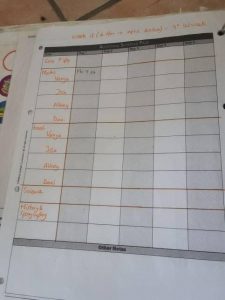
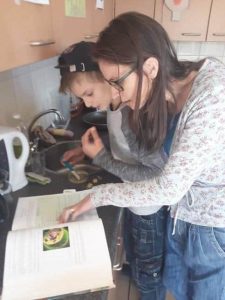
Tip #4 – We do the chores together! (03-04-2020)
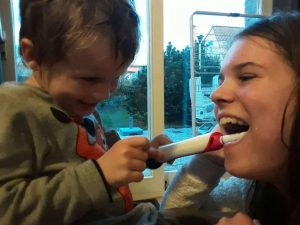 For parents home education takes a lot of (extra) time. No problem though: the children can help! Teens can cook and clean well and even a toddler can help clear away the dishes. Having the children do (more) chores not only frees the parents to home educate, but also gives children a sense of responsibility and belonging. The children might grumble and complain a bit in the beginning, but with the necessary compliments for a job well done they are sure to grow into it. 😀
For parents home education takes a lot of (extra) time. No problem though: the children can help! Teens can cook and clean well and even a toddler can help clear away the dishes. Having the children do (more) chores not only frees the parents to home educate, but also gives children a sense of responsibility and belonging. The children might grumble and complain a bit in the beginning, but with the necessary compliments for a job well done they are sure to grow into it. 😀
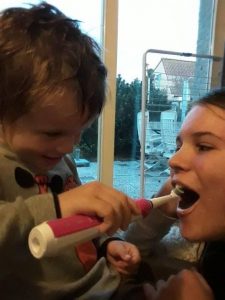
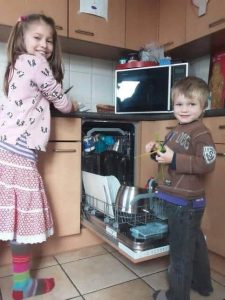
Tip #5 – You Don’t Have to be an Expert (06-04-2020)
‘Mom, when can I use a semicolon?’ or ‘Dad, how do I calculate the circumference of an ellipse?’ Please don’t panic: you don’t have to be an expert to home educate! Willingness to find the answers together is enough. In this day and age it is easy to find information about most anything online. Visit a book or website together or watch a video. Questions are a great opportunity to learn alongside your child and/or teach him or her research skills. After some practice your child will grow in confidence as she is able to find answers herself. Her attitude is sure to change from ‘No idea’ to ‘I’ll look it up!’ 🤓
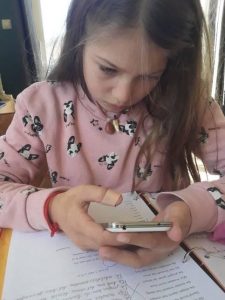

Tip #6 – Make Use of the Concentration Peak (07-04-2020)
 Much research has been done to discover the best time of day for learning tasks. For most of us the best time to concentrate deeply is in the morning around 10. Find out what subject requires most of your child’s attention and let him sit down to it around 10 am for the best results. If 10 am is a particularly unsuitable time, you can alternatively choose for one a half hour after lunch or supper, although our concentration peak is somewhat lower at those times of day. Happy studying!
Much research has been done to discover the best time of day for learning tasks. For most of us the best time to concentrate deeply is in the morning around 10. Find out what subject requires most of your child’s attention and let him sit down to it around 10 am for the best results. If 10 am is a particularly unsuitable time, you can alternatively choose for one a half hour after lunch or supper, although our concentration peak is somewhat lower at those times of day. Happy studying!
Tip #7 – Read With and To Your Child (09-04-2020)
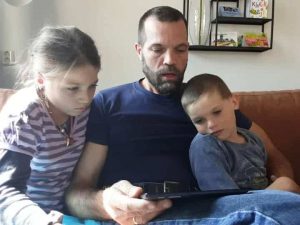 Reading is key to all further learning and paticipation in society. The ability to read is one of the most precious gifts you can give to your child. Therefore: read to your child, at least until he can read fluently himself (longer is allowed 😀). Enjoying books together whets your child’s appetite for reading, gives him a feel for language and builds his vocabulary. Secondly, have your beginning reader read to you daily – also at least until he reads fluently. Don’t be surprised if this takes long: 10 years or older is no exception for reading fluency. Reading together is one of the best investments in your child’s future.
Reading is key to all further learning and paticipation in society. The ability to read is one of the most precious gifts you can give to your child. Therefore: read to your child, at least until he can read fluently himself (longer is allowed 😀). Enjoying books together whets your child’s appetite for reading, gives him a feel for language and builds his vocabulary. Secondly, have your beginning reader read to you daily – also at least until he reads fluently. Don’t be surprised if this takes long: 10 years or older is no exception for reading fluency. Reading together is one of the best investments in your child’s future.

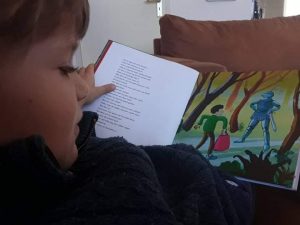
Tip #8 – Grace and Mercy are the Winning Team (14-04-2020)
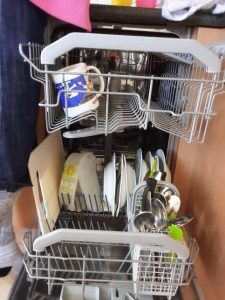 Home Educators need grace and mercy in abundance.
Home Educators need grace and mercy in abundance.
Home education means you spend a lot of time together as a family. You share moments of joy, but also of chagrin and frustration. Especially then words of grace are needed. Words that say: ‘You can try again, don’t worry if you don’t understand or if you take a long time to learn.’ Words that don’t compare and hurt, but instead forgive and give a second chance – over and over again. Words that communicate a deep and profound love for your child and patience to see him or her blossom.
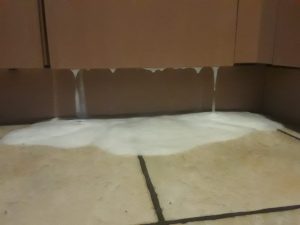 This is what happens when someone puts ‘just a little to much’ soap in the dishwasher…
This is what happens when someone puts ‘just a little to much’ soap in the dishwasher…
Tip #9 – Play! (15-04-2020)
Learning does not just happen sitting at a desk with a book and a notepad and pencil in hand. Learning happens in many different ways, amongst which is play. Play itself comes in many varieties: can be done in- or outside, can be physical or mental (even musical!), done alone or together and provides a good break from formal learning. Research shows that playing makes learning outcomes better. So, if you like your child to be a succesful learner: let him play!
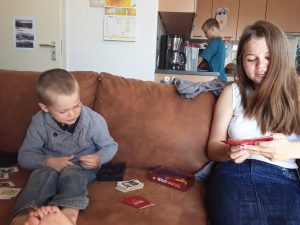
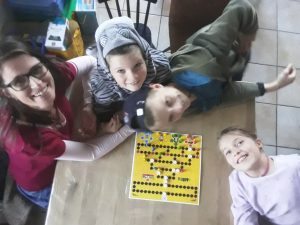
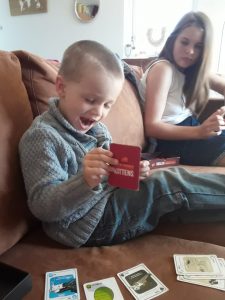
Tip #10 – A Love for Learning (17-04-2020)
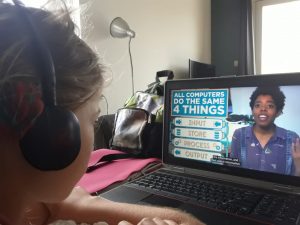 There seems to be no end to what can be learned. In the primary years we focus on reading, writing and arithmetic to use them later as tools for further studies. Once we gain an appetite for learning, the possibilities are manifold: we can learn a new hobby or game, taķe an online course, learn a language … Learning can be enjoyed by young and old, gives us healthy challenges and provides stimulation. So what would you like to learn – or teach your child – today?
There seems to be no end to what can be learned. In the primary years we focus on reading, writing and arithmetic to use them later as tools for further studies. Once we gain an appetite for learning, the possibilities are manifold: we can learn a new hobby or game, taķe an online course, learn a language … Learning can be enjoyed by young and old, gives us healthy challenges and provides stimulation. So what would you like to learn – or teach your child – today?
